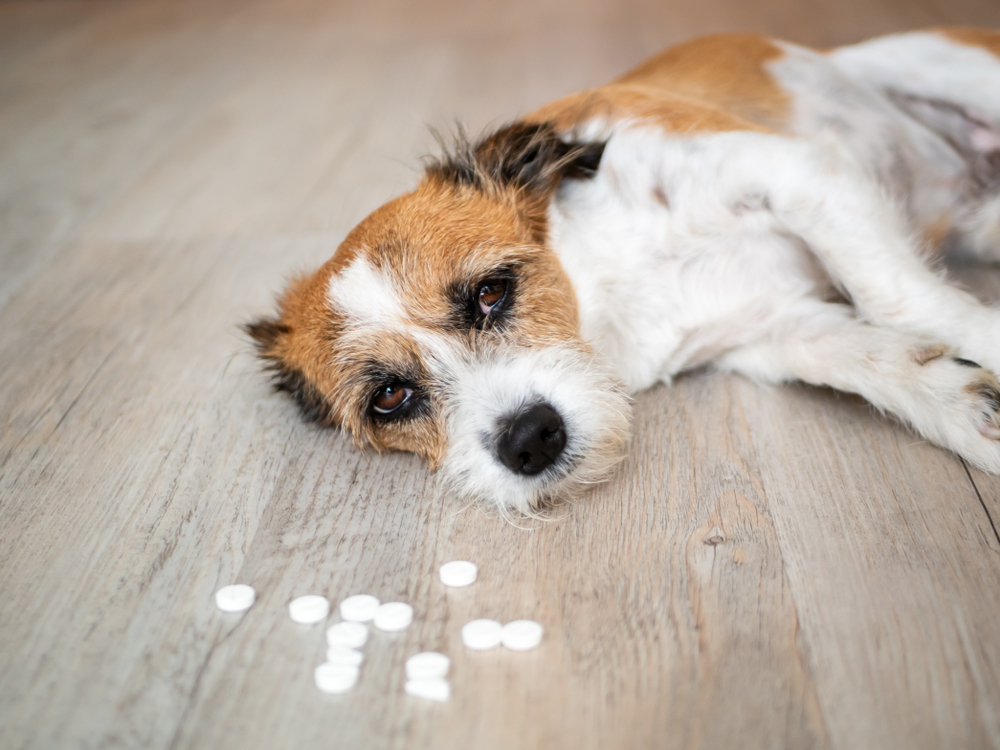Prescription and over-the-counter medications to treat pain and other conditions are common in most households. These medications may be helpful for us, but if your pet accidentally ingests one of them, the results can be devastating. When it comes to your pet’s health and safety, it is essential to understand how to prevent medication toxicity. Our team at Mount Pleasant Animal Hospital, a part of the Animal Hospitals of the Lowcounty, explains why certain medications are harmful and how you can keep your four-legged friend safe.
Common toxic medications
Medication toxicity in cats and dogs is a common occurrence. Sometimes toxicity results when a pet owner gives their pet a pill to treat pain, or when a pet comes across an unsecured bottle of medication. Before giving your pet any medication, consult your veterinarian and ensure all medications are stored safely out of your pet’s reach.
The following medications can pose a danger to your pet:
- Acetaminophen — Acetaminophen, which is found in medications like Tylenol, is toxic to cats. It can cause severe damage to their red blood cells and lead to difficulty breathing, vomiting, and possibly death. Even small doses can have serious consequences. The drug can also be problematic for dogs if not dosed appropriately or if they experience an accidental exposure.
- Ibuprofen — Non-steroidal anti-inflammatory drugs (NSAIDs) like ibuprofen (Advil, Motrin) are commonly used by humans for pain relief and are also commonly used in veterinary medicine. Human NSAIDs have a higher incidence of toxicity in pets because they are not formulated for dogs and cats. They can cause gastrointestinal ulcers, kidney failure, and other life-threatening complications if your pet receives an overdose Signs of ibuprofen toxicity may include vomiting, diarrhea, lethargy, and abdominal pain.
- Antidepressants — Antidepressants, such as selective serotonin reuptake inhibitors (SSRIs) and tricyclic antidepressants (TCAs), which are used in human and veterinary medicine can be harmful to pets if the dose isn’t correct. These medications can affect their central nervous system and lead to agitation, tremors, seizures, and elevated heart rate.
- Benzodiazepines — Benzodiazepines, which include Valium, Xanax, and Klonopin, are often prescribed for people with anxiety, insomnia, and other conditions and also for pets with anxiety and some behavioral issues. If your pet overdoses on these drugs, however, they can experience signs such as heavy sedation, disorientation, and, in severe cases, respiratory distress.
- ADD and ADHD medications — Medications used to treat attention-deficit/hyperactivity disorder (ADHD), such as Adderall and Ritalin, can be extremely dangerous to pets. These medications are classified as stimulants and can cause an elevated heart rate, elevated body temperature, tremors, and seizures in pets.
- Heart and high blood pressure medications — From beta blockers to ACE inhibitors, blood pressure medications can cause life-threatening complications for pets because they can decrease their blood pressure and heart rate to dangerously low levels. We may prescribe these medications for pets if they have a heart condition, but you should only use veterinary prescribed medications for your four-legged friend.
- Allergy medications and decongestants — Sometimes pets are prescribed allergy medications by their veterinarian, and they must always be used as prescribed. Over-the-counter allergy, cold, and flu products are a different matter since they may contain pet-toxic ingredients, including phenylephrine, oxymetazoline, xylometazoline, tetrahydrozoline, and naphazoline, which can cause adverse reactions.
Signs of pet poisoning do not always appear until the medication has been fully absorbed in their system. If you suspect your pet has ingested any human medication, contact your veterinarian immediately.
How to keep your pet safe from medications
Prevention is the key to keeping your pet safe, whether it relates to medication or another household toxin. Here are some tips to keep your furry pal safe:
- Keep all medication vials, bottles, and weekly pill reminder containers in a pet-safe/kid-safe cabinet with a lock.
- Try not to keep medications in your purse or bag, since your curious pet may want to investigate the contents.
- Avoid placing medication bottles on your bedside table, which is closer to the floor and more accessible to pets.
- Pick up any dropped pills from the floor and wipe up liquid medication spills on the counter and other areas as soon as possible.
- Avoid keeping human medications and pet medications together to prevent any pill mix-ups.
- Always contact your veterinarian before giving your cat or dog a human medication.
Human medications can provide us with relief for various ailments, but they can have devastating effects on our beloved pets. Being aware of the dangers can help prevent accidental poisonings and ensure the health and safety of your furry companion. If you suspect your pet has accidentally ingested some medication, contact our Mount Pleasant Animal Hospital team immediately.








